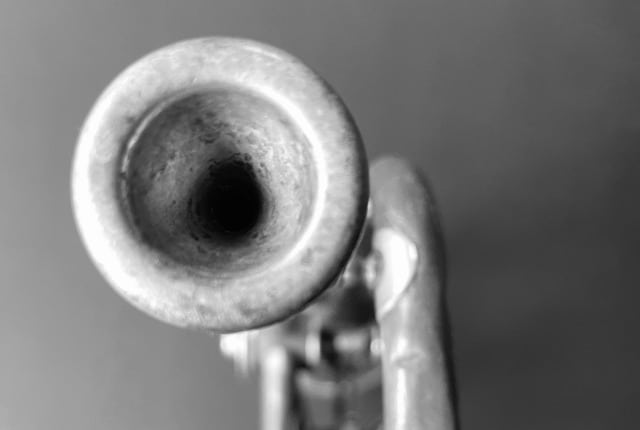Have you ever asked yourself how to practice the trumpet effectively? Find out everything you need to know about when, how, and how often you should practice the trumpet!
How often should you practice the trumpet?
The amount of practice you do will strongly determine how well of a trumpeter you will become. If you want to be a good trumpeter, you should practice about four or five times a week for at least 30 minutes each time. If you want to be even better, try practicing every day for 30 minutes or more.
As a general rule of thumb, practicing more often for shorter periods of time is better than practicing less often for a long time. Hence why practicing four or five times a week for half an hour is better than practicing once on the weekend for three hours.
Doing less than two and a half hours of practice per week likely means your progress will be slow, especially since playing the trumpet is very physical and you need to develop your ‘chops’.
However, consider that just because you are practicing diligently does not always equal great results. As Vince Lombardi said:
Practice does not make perfect. Only perfect practice makes perfect.
Vince Lombardi
If you only practice songs and techniques that are not challenging, you will not notice much improvement. The best way to practice is to always move slightly out of your comfort zone. Someone who practices songs and techniques that they struggle with will improve much faster than someone who does not.
However, do not set the bar too high and try something that is far more advanced than your current abilities. This will demotivate you from practicing and you will likely give up. Ideally, practice a song/technique that is a small step harder than what you are used to. This way you will improve at an optimal rate.
Looking for a teacher?
Want to get lessons at the comfort of your own home? Check out the course Learn to Play the Trumpet: Beginner to Pro Made the Easy Way* on Udemy! (See their full trumpet course line-up here*!)
Can you teach yourself to play the trumpet?
Yes, it is definitely possible to teach yourself to play the trumpet. However, keep in mind that it will be quite difficult. One of the greatest things to remember with self-teaching is to be patient. You should not expect to be playing your favorite tunes after a few weeks.
Instead, it will take years until you reach a good level. Another problem with self-teaching is that you will not get personalized advice for your trumpet playing like you would with a real teacher. It can be hard to understand technicalities like the right way to breathe and the right embouchure when there is no teacher there to comment on it.
When self-teaching, practicing certain techniques can be overlooked and skipped due to a lack of patience. Often self-teachers want to focus and advance the main techniques while leaving the other skills behind. As a consequence, you might struggle in the future when you have to use a technique you cannot properly perform.
Our tip: Get help from a teacher when you’re first starting out to know what to practice and pay attention to, then check back with a teacher later so they can point out any mistakes you’re making because they become too ingrained.
If you keep all of these things in mind, you can have a successful time self-teaching yourself to play the trumpet. There are many good method and practice books as well as video tutorials* out there. All of these are good options when learning trumpet.
Books can be good as they are often more in-depth on certain skills while video courses are good as you can visually see and hear the trumpet. Make sure that whatever you are learning from is high-quality and has good reviews so that you do not waste your time on something sub-standard.
It’s worth it to pay for a good course/book as you would already be saving a lot of money from not taking real lessons.
Where should you practice?
One problem many have with practicing the trumpet is that they do not want to disturb neighbors/other people in their house. Playing the trumpet can be very loud and many trumpeters feel restricted in when they can practice because of this.
One popular product that has emerged to fix this is the Yamaha Silent Brass System. This is a mute attachment that is inserted into the bell of the trumpet which also has a microphone in it. Then the user can simply plug in headphones to the device and listen at full volume while others hear almost nothing.
Other mutes can be used as well to muffle your horn, even though they do not have the microphone like the Silent Brass System. This means that the sound will sound muffled to you, the trumpeter, as well.
Note
Mutes are not a perfect option as sometimes the tone and especially volume is different when using a mute. This can make it so that when a mute is not being used, it is harder to control the tone and volume.
Another option is to install soundproofing material in the room you practice in. The amount and quality of the material installed will determine how much the noise is reduced for others. An added benefit of soundproofing is that it can block outside sounds that could interfere with your practice as well. This is very useful if you live somewhere with a lot of cars driving by.

Once again, this is not a perfect solution and while the sound to the outside will be reduced, it will likely still be heard.
Finally, if you do not want to use a mute or install soundproofing material, you can practice in a different space. You can try asking to play in practice rooms at schools and universities or even practice outside in an open space such as an empty parking lot.
How To Practice High Notes On A Trumpet
To practice high notes on a trumpet, play a middle note that you are comfortable with and work your way up the notes to the highest you can go. This is useful as you can feel when you begin to struggle and what note you stop at.
Then you can write this down in a notebook and try to beat that the next time you play. Using this practice technique, you will notice over time that you are better and more confident at playing high notes. This improvement will not come quickly though. It will likely take at least a month until you notice an apparent change.
How To Practice Endurance On A Trumpet
Good trumpet endurance is a very important skill to have. One good way to practice trumpet endurance is to simply play a single note for as long as you can. Try setting a stopwatch and then playing a note until you no longer are able.
Next, record this time in a notebook and try to beat it the next time you practice. You may not always beat your previous score, but as long as you are improving your time overall you are improving.
Tracking your progress is a great way to stay motivated by noticing incremental changes in your abilities.
Alternatively, set a stopwatch for 30 seconds and play the single note until the stopwatch buzzes. Then add five seconds every time you practice so that you are playing longer each time.
Also remember that when doing this practice, make sure you are playing a comfortable middle note. Holding a high or low note is much harder than holding a middle note. Though if your goal is to have more endurance when playing a high/low note, then this is a good way to practice.
How To Practice Pitch On A Trumpet
A useful way to practice pitch on a trumpet is to use a tuner. Get a tuner or tuner app and try playing a note for a reasonable length. Then while you are playing, look at the tuner to see if it is staying on the note you are intending.
Try to use a tuner that has a transpose feature as this will show the trumpet note instead of the concert pitch note. However, do not get too comfortable with using a tuner as you will not have it when you are doing a performance.
Make sure that you are using your ears when practicing so that you do not have to rely on a tuner to know the perfect pitch.
How To Practice Improvisation On A Trumpet
Improvisation on the trumpet is a very impressive skill that all trumpeters should try to work towards. This skill does not come easy though. First of all, you need to already be good at all the main trumpet skills to be successful in improvisation.
If you are a beginner, try learning basic songs first before trying to improvise. A good way to practice improvisation is to learn and practice the C major and/or C pentatonic scale. These are two very common scales used in trumpet improvisation.
Then try to make your own basic tunes in either scale. Each time you practice, try to make a tune that is slightly more advanced than the one before it. Also, try listening to some trumpet songs/solos for inspiration when making your own songs.
Lastly, there are books to help you learn to improvise, too, like Buster Birch’s Beginner Jazz Soloing For Trumpet* or A Daily Dose of Scales for Improvisation* by Craig Fraedrich that can help you get started.
Final Note
In my opinion, the best way to really stick with practicing and hold yourself accountable is to join a band, music group or orchestra and make music together. Not only is playing your part in an orchestra a lot of fun, you’ll also want to stick with it to not let your band mates down.
Whichever way you decide to practice, whether alone or with a teacher, for yourself or for playing in a band – make the most of it and most of all, have fun!
TrumpetHub.com is a participant of the Amazon Services LLC Associates Program, an affiliate advertising program. Links marked with an asterisk (*) are affiliate links. If you buy a product through an affiliate link, we will get a small commission without extra cost to you. This helps us earn an income off the free content we provide to you. Thank you for your support!


